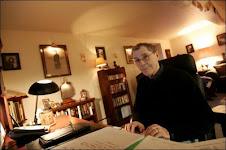Yesterday, I had the privilege of attending a lecture by Dr Matthias Kuentzel at the University of California at Irvine. Dr Kuentzel was invited to speak by the Scholars for Peace in the Middle East, a pro-Israel group. Dr Kuentzel is a member of the organization, as well as a research associate at the Hebrew University of Jerusalem. He is a German author and political scientist. He is the author of; Jihad and Jew Hatred-Islamism, Nazism, and the Roots of 9-11. In 2007, he was scheduled to give a speech at the University of Leeds (UK) on; Hitler's Legacy-Islamic Anti-Semitism in the Middle East. The university cancelled the event shortly before it was scheduled due to "security concerns" (actually, based on two letters sent to the university by Muslims protesting Dr Kuentzel's appearance.)
Dr Kuentzel began his lecture by describing the rejoicing that took place among Palestinians over the recent murder of 8 Jewish students. His thesis is that there is a nexus between Islamism and anti-Semitism. He described the birth of the Muslim Brotherhood in the 1920s as well as the activities and words of the Grand Mufti of Jereusalem, Muhammed Tahir Husseini, who was an ally of Hitler and actually lived in Berlin during the Third Reich. During those years, the Mufti participated in making anti-Jewish speeches that were broadcast into the Middle East from a radio station outside Berlin-broadcasts that were met with an enthusiastic reception.
Dr Kuentzel rejects the notion that anti-Zionism is separate from anti-Semitism. He described the situation of anti-Jewish feeling currently prevalent in the Middle East, describing the friendly reception he gets in the Middle East when people learn he is German, assuming he must be a Hitler-admirer.
In response to a question posed by me, he acknowledged that Germany's large Turkish population has become increasingly radical in the last few years in response to world events.
He also stated that the UN should act to outlaw suicide bombings, though he seemed less than optimistic about the world body's ability to have any real effect.
The audience for Dr Kuentzel's talk was small-about 20-25 people. I only knew or met a handful of the other attendees for the first time. Most were elderly and a few were retired professors.
Alarming as Dr Kuentzel's words were, it was refreshing to hear a sane voice coming out of Europe. I can't wait to get his book.
Thursday, March 13, 2008
Subscribe to:
Post Comments (Atom)














No comments:
Post a Comment